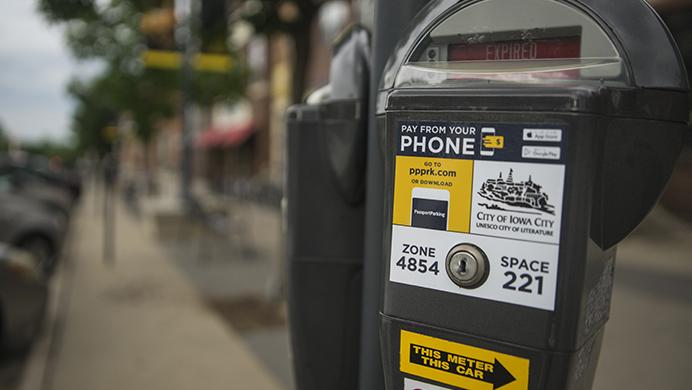By Molly Hunter | [email protected]
The city of Iowa City and the University of Iowa have teamed up to bring an app-based parking payment to town.
The app, PassportParking Mobile Pay, was introduced to make parking more convenient.
“We worked with the city to decide on a solution that would fit for both of us. That way, it’d be easy for customers to transition from one to the other and not notice a difference,” said April Wells, the communications specialist for UI Parking and Transportation.
Wells said one of the biggest complaints the UI has received was about the inconvenience of keeping coins on hand to pay for parking.
Michigan State University implemented a similar app in 2015 called Spot On Mobile Pay, which is provided through Passport Parking LLC, the company that provides the PassportParking app.
Lynnette Forman, the manager of parking operations at Michigan State, said text alerts and the remote payment option make the app more user-friendly than traditional parking meters.
“Our customers are getting fewer parking violations … and payments are up,” Forman said.
The app is cheap to implement, which is a bonus to bringing it to Iowa City, Wells said. Meters will accept coins as a payment option.
“There are actually no changes to the physical meter other than a sticker … that tells you which zone number and which space number you’re putting in,” she said.
According to a May 15 Iowa City press release, the app covers more than 2,000 city parking spaces and more than 800 UI spaces.
The city’s coverage includes both on- and off-street metered parking, as well as spaces at the city’s Chauncey Swan and Harrison Street parking ramps.
Wells said several other cities throughout Iowa have implemented similar programs, including Cedar Rapids. Also, students coming from Chicago and its suburbs are likely to be familiar with the process.
All payment information is processed through the PassportParking app and is never seen by the UI or the city. Users also have the option to save their bank information to the app for future uses, or they can choose to enter their information each time they use the service.
Charges don’t go through until after the transaction is fully completed, Wells said.
“So if you’re at a four-hour meter and you’re there for an hour and you extend your time, it’s not two charges. It’s one charge,” she said.
Almost every UI meter has been added to the system. Exceptions are meters in areas undergoing construction.
The program officially launched May 15, and Wells said the service is being used.
“PassportParking feeds information to both city and university systems, so that parking-enforcement officers can instantly verify if a payment has been made,” the May 15 press release said.
Meters paid for using the app will still display expired warnings, but Wells said that doesn’t mean the app isn’t working.
“Let’s say for example for some reason there was a technical problem, we could still go and see that you’d made the payment,” she said. “We can also see if a card was maybe declined or it expired, the one you had on file … we can go in and check and see what the actual problem was.”







